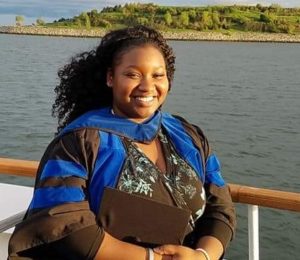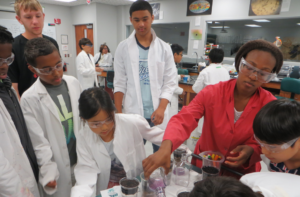Today’s post is written by guest blogger, Elizabeth Smith, PhD, Field Client Support Specialist at Promega

As a person of color (POC), I would like to share my story to raise awareness on how important diversity programs are in my community and how they helped to shape my career. My hope is that it will inspire the younger generation and provide insight into a different perspective. Growing up, I always felt like there was something great out there for me to achieve. As a young child, never did I imagine that I would have what it takes to obtain a PhD. This was not on my radar as a young student, and not something that I thought would ever be in my future. I did not see people that looked like me reflected in this space, so I never considered it early on.
I knew that I wanted to go to college with a science focus, but I did not really explore what life would look like or should look like after that. What I was sure of was being involved in science in some way. Whenever, someone asked my younger self, “What do you want to be when you grow up?” My answer would always be, “A Scientist!” All throughout elementary and high school, I focused on science related courses and did very well. This enabled me to apply for and receive a full undergraduate scholarship.
At this level of my education, I felt like I had to prove to everyone, and even myself, that I belonged here. That I was deserving of this scholarship and placement at the university. That I was good enough to receive a bachelors.
Continue reading “Demystifying What It Means to Be Good Enough…”
 This motivational quote has echoed throughout my life from childhood. It has inspired me to be fearless in dreaming, to be ambitious and to reach for those goals without fearing failure. So, naturally at the ripe age of 10, my goal was to become a scientist and discover a cure to both AIDS and cancer with a secondary plan of becoming this nation’s first female President. However, as I grew older, I realized my genuine interest and excitement for science and that I enjoyed not only learning about various scientific concepts but also sharing this information with others. Therefore, I completed a Bachelor’s of Science degree with a major in Molecular Biology and minor in Chemistry and decided to continue my studies as a graduate student at UW-Madison in the Cancer Biology graduate program. My goal was to graduate and aid in disseminating scientific knowledge.
This motivational quote has echoed throughout my life from childhood. It has inspired me to be fearless in dreaming, to be ambitious and to reach for those goals without fearing failure. So, naturally at the ripe age of 10, my goal was to become a scientist and discover a cure to both AIDS and cancer with a secondary plan of becoming this nation’s first female President. However, as I grew older, I realized my genuine interest and excitement for science and that I enjoyed not only learning about various scientific concepts but also sharing this information with others. Therefore, I completed a Bachelor’s of Science degree with a major in Molecular Biology and minor in Chemistry and decided to continue my studies as a graduate student at UW-Madison in the Cancer Biology graduate program. My goal was to graduate and aid in disseminating scientific knowledge.